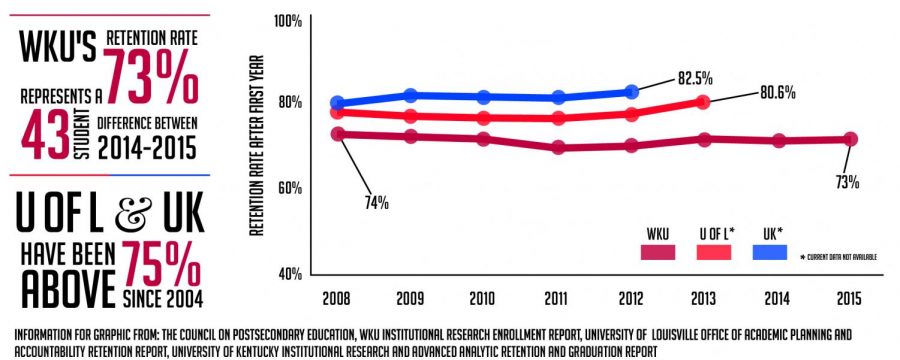WKU continues retention efforts as Bevin budget looms
February 25, 2016
In an effort to increase student retention, WKU has expanded fifth-week assessment to include sophomores in developmental courses.
These retention rates are expected to play a large role in Gov. Matt Bevin’s proposed budget. The budget will use performance-based metrics, including retention rate, to determine the amount of state funding each university or college will receive.
Aaron Thompson, vice president of academic affairs for the Council on Postsecondary Education, said the council recently submitted their suggestions for the budget proposal to Bevin.
“The one we submitted to the governor did have retention rates as a factor,” Thompson said.
Thompson explained the performance-based metrics in the CPE’s budget were measured on a seven-point scale. The goal retention rate for each college and university would be determined on a case-by-case basis.
Sue Patrick, executive director of communications and marketing for the council, said she believes performance-based metrics, which have been used by other states, will be beneficial to Kentucky universities.
“If developed properly, performance funding models can be used to incentivize improved performance in retention, graduation rates, degrees and credentials awarded and closing achievement gaps of minority students,” Patrick stated in an email.
Retention rates are measured by the number of first-time, full-time degree seeking students who stay in school from fall of their first year to fall of their second year.
According to WKU’s Office of Institutional Research, the university’s retention rates have fluctuated in the past five years. The rate of retention from fall 2014 to fall 2015 was 72.4 percent while the retention rate from fall 2013 to fall 2014 was 73.1 percent.
Christopher Jensen, assistant director for the Academic Advising and Retention Center, said students choose to leave school between their first and second year for a number of reasons.
“There’s a large transition between high school and college — just the way you have to study, the way you end up taking tests and exams, the freedom that students have,” Jensen said. “Some of them have never been away from their family before.”
WKU uses a fifth-week assessment to measure a student’s success in the first five weeks of the semester in an attempt to identify students who are at risk of failing classes or leaving school.
After the fifth week of school, a request is sent to all faculty members who teach developmental 100-level and 200-level courses. Faculty members are asked to report which students are failing the class or have excessive absences.
In the past, fifth-week assessments were completed only for freshmen. However, for this and subsequent school years, assessments will also be completed for sophomores in those developmental courses.
Jensen credits this switch to research showing students are less likely to be retained after their first and second years. Students also requested that the assessments continue through sophomore year.
“It’s our evolution of what we’ve been doing just to help students be successful at WKU,” Jensen said.
The fifth-week assessment is designed to inform students of their progress and alert those who may not be doing well. At the fifth-week mark, students still have time to recover, and if recovery in a certain class is not possible, then there is still time to drop the class and register for a bi-term.
Dropping the class will result in a withdrawal on the students’ transcripts. They must also pay the $50 drop fee.
Jensen said there are numerous ways on campus for students to improve their grades.
The AARC offers tutoring, groups on how to take notes and write papers and information on test-taking anxiety. Students also have access to the literacy center, writing center, math lab, modern languages lab and the physics lab. If personal problems are affecting a student’s grades, then the AARC will help the student set up an appointment with the Counseling and Testing Center.
“If students are willing to take those services that we offer, we’re willing to help them out with tutoring if they need that. We encourage them to talk to their professors a lot,” Jensen said.
Despite these opportunities, some students still choose not to take action to improve their grades.
“We give them all the advice; it’s kind of up to them,” Jensen said.





















![Students cheer for Senator at Large Jaden Marshall after being announced as the Intercultural Student Engagement Center Senator for the 24th Senate on Wednesday, April 17 in the Senate Chamber in DSU. Ive done everything in my power, Ive said it 100 times, to be for the students, Marshall said. So, not only to win, but to hear that reaction for me by the other students is just something that shows people actually care about me [and] really support me.](https://wkuherald.com/wp-content/uploads/2024/04/jadenmarshall-600x422.jpg)

